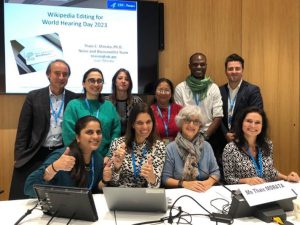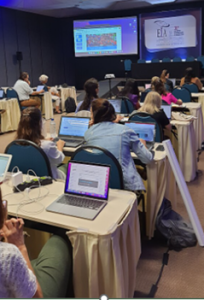Sharing quality information on all things related to hearing: Wiki4WorldHearingDay2023
Posted on byBackground
The U.S. workforce is ethnically diverse. Lack of safety and health training and language barriers are among the most frequently cited challenges companies face in promoting safety among immigrant workers (Flynn, 2014). Contributing quality, plain language health information in multiple languages to Wikipedia increases its accessibility and reach.
Unaddressed hearing loss is a serious and costly problem around the world. No matter the country, people with hearing difficulties often take years to seek care. Even when they do, uptake of recommended interventions, particularly hearing aids, is low (Wilson et al., 2017; WHO, 2017). To “raise awareness on how to prevent deafness and hearing loss and promote ear and hearing care across the world,” the World Health Organization (WHO) established the annual World Hearing Day (WHD) campaign. The campaign takes place every year on March 3rd.

Wiki4WorldHearing Day
The National Institute for Occupational Safety and Health (NIOSH) has participated in the annual WHD campaign since its launch in 2015. This year, NIOSH coordinated with the WHO Office of Ear and Hearing Care on an initiative to improve Wikipedia content related to hearing, hearing health services, hearing testing, as well as preventive and rehabilitative interventions. The Wiki4WorldHearingDay2023 campaign provided a platform to guide participants in creating/editing Wikipedia content and allowed anyone with access to a computer and the internet to participate in the campaign. This initiative was motivated by the success of two earlier campaigns, Wiki4YearOfSound2020 and Wiki4WorldHearingDay2019 (Montilha et al., 2023).
The Wiki4WorldHearingDay2023 campaign launched on November 18, 2022, with a workshop at the WHO headquarters in Geneva. Dr. Thais Morata (NIOSH) presented on the need for a multi-faceted approach to improving hearing-related content on Wikipedia. Dr. Daniel Mietchen (Institute for Globally Distributed Open Research and Education, Germany) provided an overview of health knowledge in the Wikimedia ecosystem, including examples of covered auditory topics. A recording is available here. Participants from several countries including Chile, Zambia, England, India, Austria, Brazil, Uganda, Australia, Italy, and Georgia expressed interest in editing or translating Wikipedia content into several languages.

During the campaign, Thais Morata helped lead five training courses, three in-person and two online, on how to create effective Wikipedia content for groups that joined the effort. Since receiving a federal grant in 2022 from the São Paulo Research Foundation, groups from six Brazilian universities and the University of Montreal included Wikipedia assignments focused on the promotion of hearing health as part of their coursework. Their contributions (in Portuguese) comprised 75% of all edits during Wiki4WorldHearingDay2023. Content was also added in English, Spanish, French, German, and Chinese.
The Wiki4WorldHearingDay2023 effort officially closed on March 23, 2023, at the Encontro Internacional de Audiologia in Florianopolis, Brazil. During this meeting, 50 people attended an editing workshop led by Dr. João Peschanski, director of Wiki Movimento Brasil.
Measuring Reach
The Wikimedia outreach dashboard allows anyone to monitor contributions and impact of articles with a great level of detail and accuracy. Contribution tracking took place between November 17, 2022, and March 31, 2023. A total of 142 individuals (or groups) participated in this effort. At the conclusion of the campaign, 288 articles had been edited, 50 new articles created, 140 media files uploaded to the open access repository WikiCommons, and more than 248 references added. At the end of the event, on March 31, 2023, tracking indicated that contributions specific to Wiki4WorldHearingDay were seen by 12.9 million visitors in the 4-month period of the online campaign. The views continue to grow, reaching 17.7 million by May 1, 2023.

Topics edited included hearing disorders, health care, music exposures, risk factors, prevention practices, and media coverage of hearing and deafness through films and documentaries. Viewing metrics allowed the campaign to learn about the topics that provide the most interest to the public. Specifically on hearing conditions, the topics which attracted most viewers were:
| Wikipedia Article | Views |
|---|---|
| Tinnitus | 243,716 |
| Meniere’s disease | 208,809 |
| Sign language | 109,387 |
| Cauliflower ear | 80,372 |
| Cholesteatoma | 39,279 |
Conclusion
Contributing quality plain language health information to Wikipedia increases its accessibility and reach. Wikipedia metrics allow researchers to learn what health topics are attracting public interest. The Wiki4WorldHearingDay2023 effort illustrates that the expansion of occupational safety and health content in Wikipedia and its translation into multiple languages can reach a large segment of the public searching for that information. Wikipedia can make a meaningful contribution to improving heath literacy in the general population and the working population, both in the United States and abroad.
Thais C. Morata, National Institute for Occupational Safety and Health, USA
Lillian Jacob, University of São Paulo, Brazil
Fernanda Zucki, Federal University of Santa Catarina, Brazil
João Alexandre Peschanski, Wiki Movimento Brasil, Brazil
Shelly Chadha, Office of Ear and Hearing Care, World Health Organization
References
Flynn MA (2014). Safety & the Diverse Workforce: Lessons from NIOSH’s Work with Latino Immigrants. Professional Safety, 59(6), 52–57.
Montilha AAP, Morata TC, Flor DÁ, Machado MAAM, Menegon FA, Zucki F. The Promotion of Hearing Health through Wikipedia Campaigns: Article Quality and Reach Assessment. Healthcare. 2023; 11(11):1572. https://doi.org/10.3390/healthcare11111572
WHO, Global costs of unaddressed hearing loss and cost-effectiveness of interventions. World Health Organization, Geneva (2017), accessed May 3, 2023.
Wilson BS, Tucci DL, Merson MH, O’Donoghue EL. Global hearing health care: new findings and perspectives. Lancet, 390 (2017), pp. 2503-2515.
Posted on by

